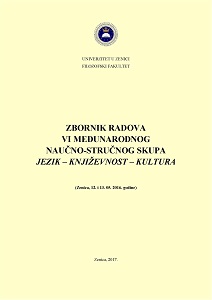RANO UČENJE NJEMAČKOG JEZIKA (VESELE RADIONICE ZA UČENJE NJEMAČKOG JEZIKA)
EARLY LEARNING GERMAN LANGUAGE (HAPPY WORKSHOPS FOR LEARNING GERMAN)
Author(s): Jasmina Tockić-Ćeleš, Veldina Alibegić
Subject(s): Language and Literature Studies, Education, Foreign languages learning, Preschool education, School education
Published by: Filozofski fakultet, Univerzitet u Zenici
Keywords: native language; foreign language; early german language learning; workshop
Summary/Abstract: In everyday life many children are very early encounter with foreign languages through contact with modern media and communication technologies, which directs them to that very quickly and they adopted many foreign words and phrases they learn in that way. The increasing focus on multilingualism has led to the earlier start to learn the first foreign language in schools. The presence of foreign language learning can be recorded in many kindergartens. Early language learning helps children develop a positive attitude towards other cultures and languages as well as the creation of high-quality foundation for learning other foreign languages at an earlier age. English as a first foreign language at an early age provides a good basis for learning other foreign languages in middle school. Although many prefer English as the first foreign language, the fact is that our country and the economic environment, tourism and other forms maintains contacts with German-speaking countries, this is an evident need for knowledge of the German language. The intellectual and the overall development of the child are also encouraged for early foreign language learning. Pilot project "Happy Workshop" for children in the second grade of elementary school allow introduction and adoption of German at them friendly way, or through play, song and dance. At the same time workshops are important and are designed to develop talent in children. Tasks are set to lead a child from easier to more difficult exercises, from the concrete to the abstract, from the whole to the individual. The results of the workshops show that children quickly acquire German direct participation in the song and game: 40% of students is entirely mastered presented linguistic fund, 40% in part - have difficulty to repeat the entire linguistic fund, while 19.5% of students only with the help of teachers can repeat the entire linguistic fund, but only 0.5% cannot overcome linguistic fund
Book: ZBORNIK RADOVA VI MEĐUNARODNOG NAUČNO-STRUČNOG SKUPA "JEZIK – KNJIŽEVNOST – KULTURA"
- Page Range: 298-305
- Page Count: 8
- Publication Year: 2017
- Language: Bosnian
- Content File-PDF

